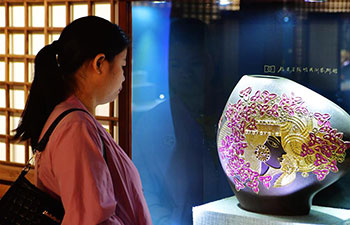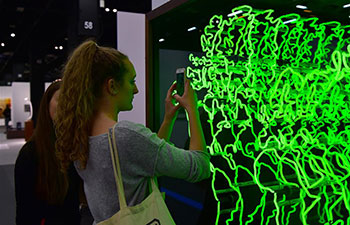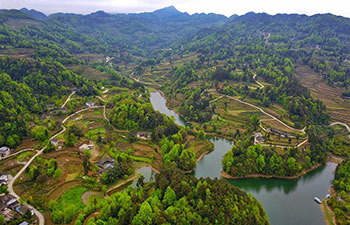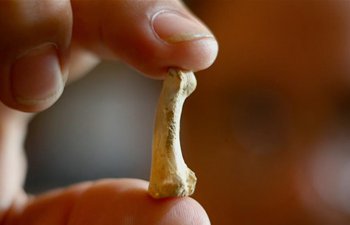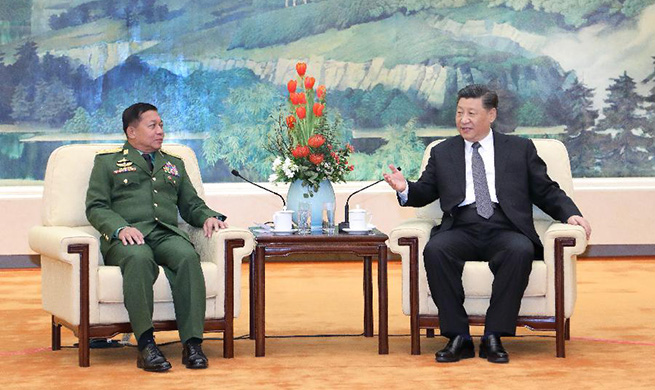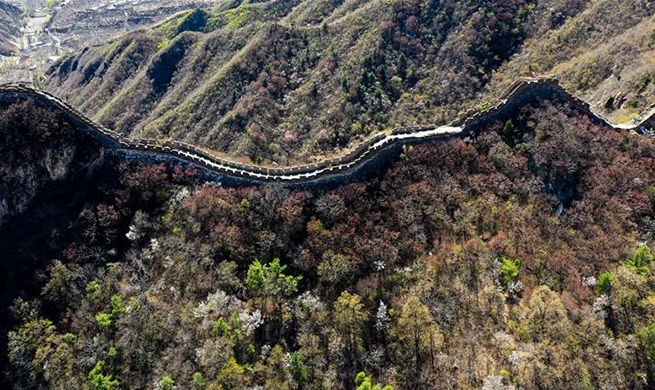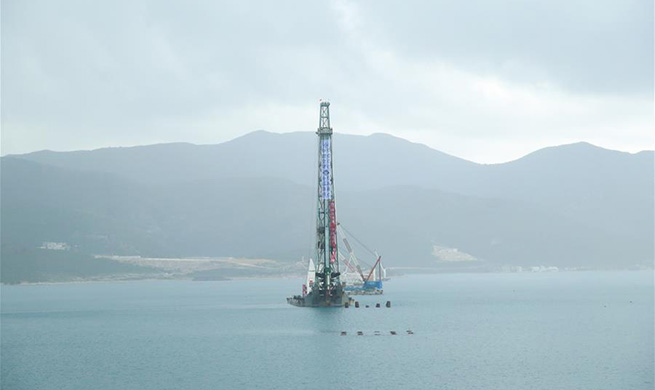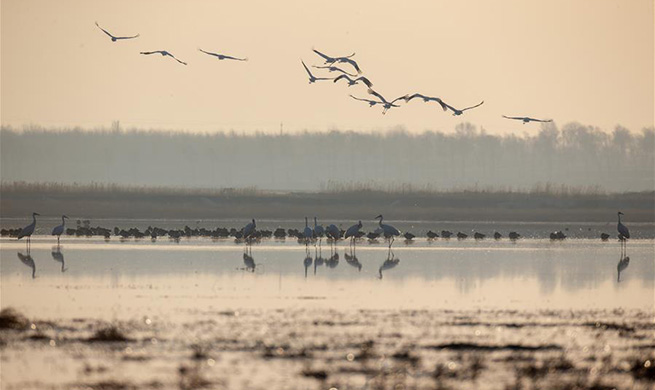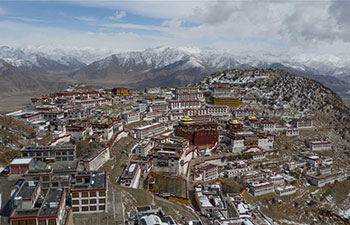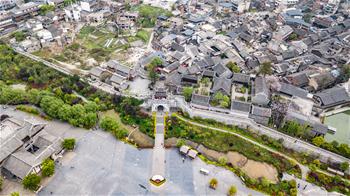SAN FRANCISCO, April 12 (Xinhua) -- A photo exhibition at Stanford University celebrating the 150th anniversary of the First U.S. Transcontinental Railroad in the 19th century has unveiled many hidden historical details of tens of thousands of Chinese immigrant workers that built the milestone American infrastructure project.
The show, which was held Thursday to honor the Chinese migrant rail workers, featured historical photographs, oral histories, lesson plans, artifacts, digital documents and other materials of a seven-year-long Stanford research program, the Chinese Railroad Workers in North America Project.
The Stanford research project unveiled the untold history of the Chinese migrants who toiled at a grueling pace to help construct, under perilous working conditions, the transcontinental railway between 1864 and 1869.
UNKNOWN HISTORY OF CHINESE MIGRANT WORKERS AT CONSTRUCTION SITE
The study revealed for the first time many findings of the Chinese railroad workers whose contributions to one of the most ambitious American engineering projects had long been left forgotten in U.S. history.
Gordon Chang, co-director of the project and professor of history of the Center for East Asian Studies at Stanford, told Xinhua that many Americans don't know about the role of the Chinese immigrants in America.
"I think it's important for Americans, white Americans to know the Chinese helped build America and are part of America from the very beginning, so that we can be a more diverse and understanding society," Chang said.
He said many people have paid little attention to how many Chinese workers were employed at the construction site, and the number has arguably varied from time to time because of the turnover. "They don't work all the way through," he added.
"Our research indicated that there were always thousands of Chinese migrant laborers working to build the railroad, and at the peak time, about 25,000 Chinese laborers were at the construction site," he said.
"They constituted 90 percent of the workforce on the western portion of the railroad. They completed the railroad and they made Leland Stanford very wealthy. So Stanford University would not have been possible without the Chinese," said Chang, referring to the creator of Stanford who spent much of the wealth from the rail project to establish one of the world's most renowned universities in 1885.
SOLID EVIDENCE HIGHLIGHTS UNBEARABLE HARDSHIP SUFFERED BY CHINESE WORKERS
Chang said the Chinese workers did much incredible work during the construction, including tunneling through hard granite, 15 tunnels through the ground.
He pointed out that one of the big controversies is about the skepticism surrounding the Chinese workers hanging down in mountain cliffs in baskets to carve out the rail line around Promontory Summit, a high ground area in Utah State, where the First Transcontinental Railroad in the United States was officially completed on May 10, 1869.
Chang said the solid evidence of their extensive research from field trips and visits to families of the descendants of the Chinese immigrants showed that the Chinese railway workers endured incredible hardships during the construction process. They did use the baskets when they hung down from the side of mountains to put dynamite into black powder to blow up the rocks.
"They deposited tons and tons of rocks down into the American river 1,200 feet (about 366 meters) below. So baskets (were used). No myth," Chang told hundreds in attendance at his presentation about the disputed point in the past.
CHINESE WORKERS ON MASS STRIKE FOR PAY HIKES
Chang said the Stanford researchers have known more about the 1867 mass strikes called by the Chinese railroad workers.
In the summer of 1867, the rail workers became unsettled with their poor working conditions, low wages and abusive treatment from their supervisors.
About 3,000 Chinese workers up at the Promontory Summit and spreading out over miles of their work area all at once went on strike, which was the largest strike in American history to that date, he said.
Given the organization and communication among these workers spreading out over miles, as well as the courage it took to stand up to the railroad company, way up in the high Sierra mountain range, Chang said, the work stoppage was not purely out of desperation and weakness, but out of strength and courage.
CHINESE WORKERS HAVING MATURE BUSINESS TALENT
New findings of the Stanford research program broke a stereotyped negative concept of the Chinese laborers and cast light on their mature business talent that surprised their white bosses, said Roland Hsu, director of research of the seven-year-long Stanford program.
He told Xinhua during the photo exhibition that their research has changed the way people have thought about the Chinese who came to the United States in the 19th century.
"Traditionally, much of the research results, which are well intentioned, identify the Chinese as victims as sort of (being) more passive for their suffering," he said.
"What we find is indeed they endured many hardships, but they were also very enterprising. And the Chinese who came are also very experienced on how to profit from their labor," Hsu explained.
During the railway's construction, Hsu said, the Big Four investors of the Central Pacific Railroad, including Leland Stanford, Collis Huntington, Mark Hopkins and Charles Crocker, could not find 10,000 to 12,000 Chinese workers to build the railroad.
Therefore, they asked some Chinese to find other Chinese as additional labor force for the transcontinental railway project, Hsu said.
"Those were sort of sub-contracting that showed real business skill, or business acumen that changes. That's an impact on our understanding of who were the Chinese," he said.
"In my opinion, the most important discovery is the business talent the Chinese came with, and they were not all menial laborers who were exploited. There were many who actually ... controlled quite a large labor force, and in that way changed the reputation of the Chinese in the white business leaders' eyes," said the Stanford scholar.
He said the researchers found the payroll records of railroad construction companies to support their views.
"We were able to find the payroll records. The big journals with all of the paid, we find Chinese names. We did the math. And that's where we find the sub contractors," he explained.
"We find the Chinese sub-subcontractors sub-contracting other Chinese workers," he said. A few of them even partnered with white locals for business and made a big business, which demonstrated their leadership on construction project.
CHINESE WORKERS SHAPED AMERICA'S LANDSCAPE
Shelley Fisher Fishkin, co-director of the research program and director of American Studies at Stanford, said the Chinese migrant railroad workers is a crucial part of American history, of Western history and of Chinese history.
"There are many discoveries that were fascinating, but I my own research taught me that when the railroad, when the First Transcontinental Railroad was completed, the Chinese workers went on to build more than 70 rail lines all over the United States, and then into Canada," she said.
"I was fascinated by that. I even found that 300 Chinese workers had been rebuilding the rail line near my grandmother's home in Long Island, New York," added Fishkin.
These Chinese workers had shaped America's landscape beyond the first transcontinental line, she noted.
With the exhibition, "by reminding everyone that our two nation's fates were intertwined from this early moment, it would lay the groundwork for future good relations between the two cultures," Fishkin said of the vast and extensive relations between the United States and China.
STANFORD PROJECT FOSTERS CLOSER BOND BETWEEN U.S. AND CHINA
Hsu also said Thursday's exhibition is meant to make it available to all the public that is interested in learning about Chinese heritage, the history of the American West, and really the story of the first moment of globalization where North America connected with Asia in labor, economy and culture.
Persis Drell, provost of Stanford University, called the exhibition "a really important and even a momentous occasion marking the culmination of the project at Stanford."
"It's the story of hard-working individuals whose strength, skills and above all resilience in the face of danger, discrimination and hardship, paved the way in uniting our country from the Atlantic to the Pacific," Drell said.
